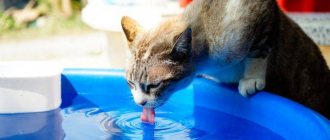Diet
A cat's diet should mostly consist of animal proteins .
For them, eggs are an additional source of protein, which is on par with meat and fish. Methionine, lysine, tryptophan are amino acids that are part of protein and are of great benefit to pets. Shiny coat, prolongation of the active period of life, good immunity, good mood, prevention of heart disease - this is all the merit of eggs. Any food must include a whole egg. In addition to proteins, they contain a large amount of vitamins and minerals, which ensure normal functioning of the entire body. Eggs are rich in phosphorus, calcium, iron and magnesium. Thanks to them, cats’ blood vessels and joints will be healthy, bones will be strong, and hormones will remain in balance.
Harm and benefit
A chicken egg contains protein, potassium, magnesium, vitamin D, phosphorus, sodium, iron and other useful microelements that promote healthy growth and proper development of the pet.
Benefits of eggs in a kitten's diet:
- an easily digestible product ensures a good mood and healthy sleep;
- strengthens the immune system, skeletal system and muscles;
- ensures normal functioning of the whole body;
- improves metabolic processes;
- restores nerve cells;
- normalizes brain activity;
- helps cleanse blood vessels;
- improves acid-base and hormonal balance;
- improves the condition of teeth and gums;
- increases the activity of kittens;
- has a beneficial effect on the condition of the coat, which acquires shine and silkiness.
Considering the list of beneficial properties, the question - can cats have boiled eggs becomes irrelevant, because the answer to it is quite obvious!
However, there are some disadvantages of this product. For example, egg white can cause allergic reactions in a pet, which is manifested by severe itching of the skin, upset stool and vomiting.
If such symptoms are detected, exclude protein from the cat’s diet! You can only leave the yolk on the menu, which is quite healthy and completely safe for animals prone to allergic reactions.
Allergy to milk
Milk contains more than 40 different proteins, and each of them contributes to allergies. In general, allergenic proteins come in two fractions - caseins (80% of milk proteins, insoluble, form clots - “curdles”) and whey proteins (20%, soluble in whey).
The most important milk allergen is casein.
. Casein fraction (Bos d allergen - these are four types of caseins: alpha-S1-caseins (Bos d 9), alpha-S2-caseins (Bos d 10), beta-caseins (Bos d 11) and kappa caseins (Bos d 12 ).
Casein fraction (Bos d allergen - these are four types of caseins: alpha-S1-caseins (Bos d 9), alpha-S2-caseins (Bos d 10), beta-caseins (Bos d 11) and kappa caseins (Bos d 12 ).
Being a heat-stable protein, it is capable of causing a reaction in sensitized patients when consuming foods, both raw and cooked, thermally processed. If you are allergic to this particular protein, all dairy and fermented milk products are excluded from the diet. If you are allergic to Casein, you must exclude absolutely all dairy-containing products from your diet, including baked goods, ice cream, some sauces, etc. Casein and caseinates are used as fillers for sausages, loaves, soups and stews.
If it is caseins that cause an allergic reaction, then milk and products containing it will have to be eliminated completely.
The remaining components of milk (alpha-lactalbumin, beta-lactoglobulin, whey proteins) lose their allergenic properties during frying/cooking/baking, etc.
Alpha-lactalbumin (Bos d 4, α-lactalbumin)
is about 25% whey and 5% cow's milk proteins. This is a calcium-binding protein involved in the synthesis of lactose in the mammary glands and in the formation of immunity. It is important that the protein is heat labile, that is, during heat treatment it loses its allergenic properties. Cross-reactivity between bovine protein and protein from other animals is quite possible, but scientists have not yet been able to fully answer this question.
Beta-lactoglobulin (b-lactoglobulin)
in whey there is twice as much α-lactalbumin. However, it is not found in human milk at all, not even analogues. But this protein can cause cross-reactions with milk proteins of mice/rat, cats, dogs, horses. Fortunately, this protein is also heat labile and loses its allergenic properties already at 90*C. Another great news is the fact that in yoghurts and other fermented milk products, under the influence of fermentation, b-lactoglobulin also loses its allergenic properties and becomes safe.
Bovine serum albumin (Bos d 6, BSA)
is the main protein of cow's milk, which is found not only in milk, but also in beef and cow plasma. Fortunately, protein is heat labile. It is a minor cow's milk allergen that is physically and immunologically very similar to human serum albumin. It transports small molecules and protects against free radicals. When heated, this allergen is destroyed. BSA is used in cosmetology (as an additive in anti-wrinkle creams) and even as a nutrient medium for cells in the field of artificial insemination.
The ImmunoCap component diagnosis of milk allergy will allow you to check which dairy products you can use.
(ImmunoCAP). The study allows us to differentiate sensitization to heat-stable and heat-labile fractions of milk proteins and resolve the issue of the possibility of eating certain dairy and fermented milk products by patients with milk allergies.
Make an appointment with an allergist
How often?
Although a food product is very healthy, this does not mean that it should be given to the animal often; variety is very important in nutrition. It is enough to give your cat eggs 2-3 times a week , but not whole eggs, but in fractions. That is, one egg should be divided into three meals. An adult cat can be offered one egg per week, but small kittens should not be given it until they get used to cottage cheese and meat, that is, it is necessary to try it for the first time when the animals are 3 months old. You can also offer quail eggs to animals; they contain less cholesterol and are therefore considered more healthy.
Do cats eat eggs?
When feeding cats, be guided by what these animals consume in the wild.
The cat is a predator whose diet is based on small rodents, amphibians and birds. From time to time, cats also eat eggs, climbing trees and destroying bird nests. Therefore, the cat can be fed with them, but in moderation. They are given to small kittens from 2-3 months of age. Unlike a dog or a human, a cat is a classic predator that has not developed omnivory. Therefore, pets must be fed mainly animal proteins (proteins). First of all, this includes meat. But since it is expensive, you can buy meat by-products: heart, kidneys, tripe, intestines, lungs and internal organs. However, even in this case, the daily ration will remain quite expensive.
If the owners’ income is limited, then veterinarians in this case recommend changing part of the menu to eggs. Firstly, this product contains many animal proteins and valuable amino acids, which is beneficial for animals. Secondly, cats in the wild eat eggs and digest them well, so there is definitely no harm from them.
Chicken or quail
Quail eggs are better than chicken eggs only in that they are digested better and faster and contain a little more nutrients . A quail egg will bring much less benefit to a cat than a domestic chicken egg. Chicken and quail eggs can equally contain bacteria that lead to salmonellosis.
They can also cause allergic reactions and intolerance. Quail eggs can be fed to pregnant cats. If she is reluctant to eat them, then you should mix them into her main food. Cats that are preparing to become mothers need vitamins more than others, so you can feed them quail eggs two to three times a week.
Dosage
Some veterinarians recommend introducing eggs into the diet once a week. It is recommended to accustom kittens to the product when they are 3 months old. You can prepare boiled protein by mixing it with cottage cheese. Or you can beat the raw yolk.
The product is recommended only for natural feeding. If the cat eats food, then eggs should be discarded. They are included in the food.
They are not prepared for very small and elderly animals. With cardiovascular diseases, cholesterol may increase. Therefore, it is better for sick pets to abstain from the product.
Do you need to cook?
A good option is to offer your pet boiled eggs . They can be mixed with meat or cottage cheese if he refuses the product in its “pure” form. It is not recommended to give fried eggs in oil to cats. The best option would be to pamper your cat with a steamed omelette without adding salt. To make it fluffy and tasty, add warmed milk while whipping.
Under no circumstances should cats be offered raw eggs! They may contain E. coli, which will lead to inflammation of the pancreas. In their raw form, they are very poorly digestible. Crude protein can remove a number of vitamins from the body, and leads to their deficiency, even if the cat’s nutrition is complete. Raw yolk is considered healthy, but only from homemade and fresh eggs.
Important! Quails should also not be offered raw to cats, because there may be bacteria on the shell and inside that can lead to very dangerous diseases.
Boiled eggs are no less dangerous for animals than raw eggs. They need to be cooked for at least four minutes, because the causative agents of salmonellosis die only at high temperatures. In this case, you can be sure that your pet will eat a safe product that will not cause any harm.
Contraindications
Contraindications mainly include allergies, but an allergic reaction to eggs is extremely rare. Signs of egg protein intolerance include vomiting and diarrhea. It is not worth giving raw eggs to kittens until they are six months old, since in this form the protein is not very well absorbed; it is better to cook them before giving them to them.
Protein is contraindicated in case of urate and oxalate kidney stones, but in this case the pet can be fed the yolk. With phosphates and struvite, on the contrary, the yolk is allowed, but the protein must be excluded from the diet. Of course, measures can be taken after establishing the acidity of urine and the nature of urinary stones.
In what form can you give eggs to a kitten?
You can give kittens both chicken and quail eggs. The latter are considered more useful because they contain less cholesterol, are more nutritious and are easier to digest by the body. Pregnant and lactating females should be given any eggs with caution, as they can negatively affect the offspring.
To avoid harm to the kittens, giving raw eggs is strictly prohibited! The raw product may contain salmonella. Kittens aged 1-2 months are especially susceptible to salmonellosis. This dangerous intestinal infection can be fatal.
© shutterstock
Raw egg whites contain advidin, a substance that is dangerous for cats and leads to a lack of biotin. A deficiency of this vitamin manifests itself in kittens in the form of skin lesions, exhaustion, nausea, and hypertension.
Raw quail eggs should also not be given to pets, as they may contain pathogens of dangerous diseases, to which young individuals are especially susceptible. You should not offer your kitten fried eggs; a large amount of fat will lead to digestive problems.
To be sure that the product will not harm the baby, it needs to be boiled for about 5 minutes. The quantity should also be limited - 1/4 of a chicken yolk or 1 whole quail, no more than 1-2 times a week.
For whom eggs are contraindicated?
Some cats have an individual intolerance to egg whites, and eggs cause allergic reactions in them. Allergy symptoms include itching, swelling, and rashes can be observed around the ears and face. Possible vomiting and intestinal upset. In these cases, chicken eggs should not be given to the cat. Quails are also allergic, so the ban applies to them as well.
Raw eggs (especially white eggs) should not be fed to pregnant or lactating cats; eggs should be added to the diet of animals suffering from liver and kidney pathologies, chronic heart and vascular diseases with extreme caution. If possible, it is better to exclude them from the diet.
Important!
The yolks of chicken and quail eggs are strictly prohibited for animals with urolithiasis.
You need to be careful when giving industrially produced eggs to cats - at some poultry farms, chickens may be given antibiotics to protect them from infectious diseases. With eggs, antibacterial additives can enter the animal’s body, where they can reduce the functions of the immune system and cause improper functioning of internal organs.
Important!
It is recommended to consult a veterinarian before formulating a diet. Before adding eggs to your pet’s food, it is advisable to get tested for the content of vitamins in its body.
Egg dishes
Pets enjoy eating steamed omelettes. You need to add a little milk to the egg. Spices are not added to the dish. Fat is also contraindicated.
Boiled eggs are healthy, nutritious, and desirable on a cat’s menu. They can be served along with porridges and vegetable purees. But you should avoid fried eggs. They do not benefit the animal's body.
Shell
You can add a pinch in ground form.
But if the cat suffers from urolithiasis, then the shells should not be consumed. Also, it is better for miniature breeds to avoid this product altogether.
Photo of feeding cats eggs
Felix food for cats: reviews, composition overview, use in the diet, price and food combinations (125 photos)What to feed a sterilized cat: video tips on how to properly, what and when to feed a cat after sterilization (125 photos + video)
Wellness for cats - choice of food, analysis of composition, reviews and overview of the most popular types (100 photos)
Read here Brit food for cats: price review, reviews from veterinarians, description, pros and cons of using it in the diet (90 photos)
Help the site, share with friends 
2
How to teach your pet to eat eggs
Sometimes the cat starts to eat and eats the product itself. But some animals turn their faces away. The product is odorless, so it is better to gently poke the purr with your nose. Then he understands that he needs to eat it, and starts eating.
If a cat constantly rejects eggs, then you should not force him. This product just doesn’t suit him for some reason.
If the cat turns up his nose
Just like people, cats have their own food preferences. And if you can’t pull some people away from this dish by the ears, others turn their noses up at it. The thing is that eggs have virtually no odor, so the cat may not pay much attention to them. You can help your pet recognize it by gently poking its nose at the product, thus showing that this food is completely safe and edible.
If this fails to convince the cat, then there is no need to insist. This means that the pet simply does not like eggs and it is worth looking for another way out of this situation. For example, a new product can be “camouflaged” by taking advantage of the fact that animals react to the aromas of the dish rather than its appearance. The egg can be grated and added to your usual dishes.
Some cats have a weakness for fried eggs. Of course, this is not the healthiest dish, since the presence of overcooked butter will not improve the health of the animal, and the owners are unlikely to prepare it separately for their purring gourmet, however, occasionally the pet can still be pampered.
In addition, you can give eggs with your favorite treats; your pet will hardly be able to resist. They can be mixed with minced meat, pieces of fish, liver or other product that the cat is partial to.
Eggs are often given to cats as a food supplement. Is it possible to do this?
Cat lovers, breeders and veterinarians say that it is necessary to include them in the diet.
Only they differ in their opinions regarding whether to give raw or boiled, chicken or quail.
So can cats have eggs? Let's look into this issue.
Raw and cooked eggs contain avidin and biotin (vitamin H). Vitamin H improves the condition of the coat. The fur becomes smooth and shiny.
But opinions differ regarding the yolk or white.
Some believe that only the yolk should be given as food, since it does not contain avidin, which interferes with the absorption of vitamin E. Some also mix the yolk with a small amount of milk.
Others believe that the cat should be fed the whole egg. It is advisable to beat it well first.
There is no consensus on this matter.
If you choose raw eggs for your cat, then at least buy them from good farmers or friends.











